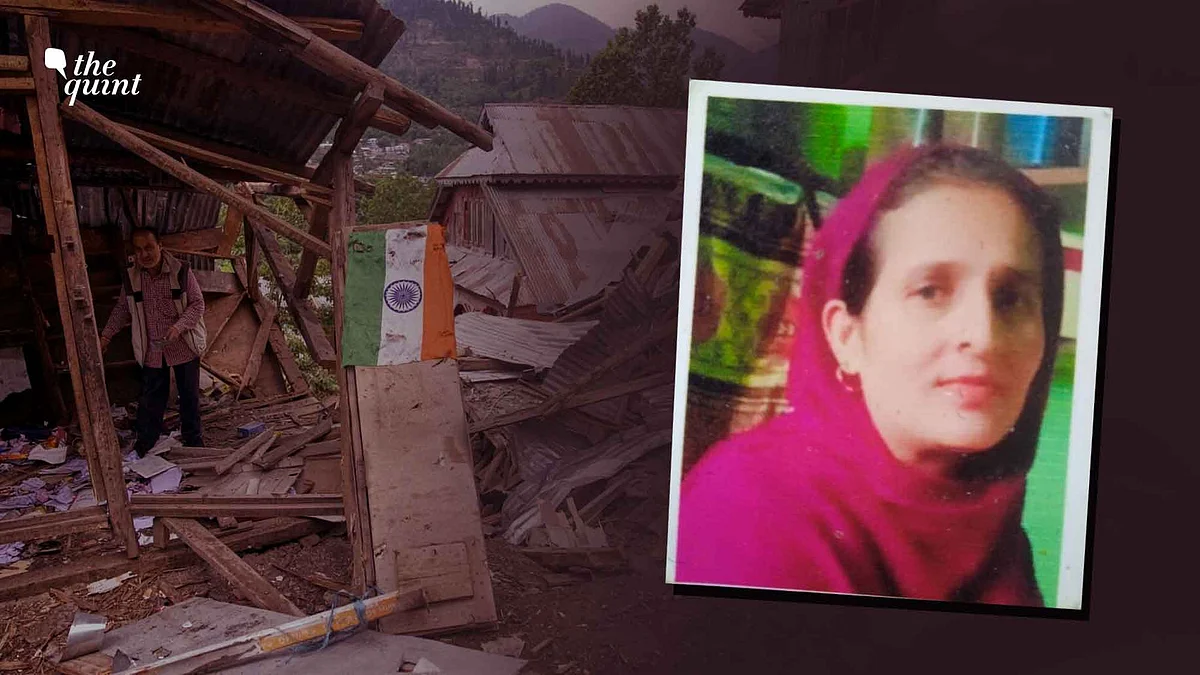'Heard Screams, Then Saw Blood': Woman Killed in Moving Car Fleeing Uri Shelling
Nargis Begum was killed after a shrapnel hit a moving car in Uri near the Line of Control.

advertisement
After a tense night of shelling on 7 May, Nargis Begum, a resident of Razarwani village in Kashmir's Uri, sent her two older daughters to a relative's place 60 kilometres away in Baramulla.
Initially reluctant, 28-year-old Rumeena Bashir and her sister left on the afternoon of 8 May. Nargis' youngest daughter and son insisted on staying back with their mother.
Along with her two brothers-in-law, her children, and other relatives, Nargis boarded an SUV belonging to Tabriz Khan, her youngest brother-in-law. The family had only driven a few kilometres from their home when a shell exploded nearby—and a shrapnel tore through their vehicle.
The SUV in which Nargis and their family members were travelling.
(Image accessed by The Quint)
The shrapnel grievously injured Nargis and her sister-in-law Hafiza. The same night, Nargis succumbed to her injuries. She was 45.
'Drove With Headlights Off...'
"When we left the house, it was already dark, and Pakistan had intensified the shelling. I had turned off the headlights, and drove with only fog lamps. We would have driven only a few kilometres when a sudden bang happened, and the SUV jerked in the air," 32-year-old Tabrez Khan, who was driving the car carrying the family, told The Quint.
The hole made by the shrapnel on the roof of the car.
(Image accessed by The Quint)
Without wasting any time, Tabrez rushed to the Primary Health Centre in Mohara, which is around 15 kms from Razarwani. "The doctors in Mohara provided us with an ambulance and referred her to the Government Medical Hospital in Baramulla. It took us around 40 minutes to reach there. Upon arrival, the doctor declared Nargis dead," Tabrez said.
The shrapnel tore through the roof and entered the car cabin where Nargis was sitting.
(Image accessed by The Quint)
“If there had been a bunker, we wouldn’t have fled,” said Aslam Khan, Nargis' relative, with his voice cracking.
'My Mother Was Lying in a Pool of Blood'
"My brother said he saw our mother lying in a pool of blood at the hospital," said Rumeena, who received the news of her mother's death the next morning.
"She was too weak to survive such blood loss," she added.
Nargis' death has shattered the family who was preparing for Rumeena's wedding after Eid-al-Adha in June. “I wish the shell had hit me instead,” she cried.
Nargis was a contractual cook at a local government school and earned Rs 2,500 a month. Despite some heart issues, Nargis focused on her children’s education and marriage.
"She never visited any doctors—always saving every single rupee for us,” her family shared. "She helped marry off one daughter last year, and still worried about repaying the loan."
The family, including Nargis’ elderly parents with deteriorating vision and a diabetic husband, now takes refuge in a relative's home in Sangri Bala in Baramulla. They left behind everything, trusting Nargis would bring their belongings later.
Nargis' husband Bashir Khan has since been hospitalised thrice after he complained of anxiety, hypertension, and high blood sugar levels.
Tariq Amhad Sofi, sub-divisional police officer, Uri, confirmed only one civilian death in the area, however added that data on injured was still being compiled. The Jammu & Kashmir government has announced Rs 10 lakh as ex gratia compensation for the families of civilians killed in cross-border firing.
On 7 May, after India successfully destroyed the nine terrorist sites in Pakistan under Operation Sindoor, Pakistan launched heavy shelling across the Line Of Control in several sectors of Jammu and Kashmir.
While the ceasefire with Pakistan was announced at around 5:30 pm on 10 May, between 7 May and 10 May, at least 18 civilians and seven security personnel were killed in the cross-border fire along the LoC in Jammu and Kashmir.